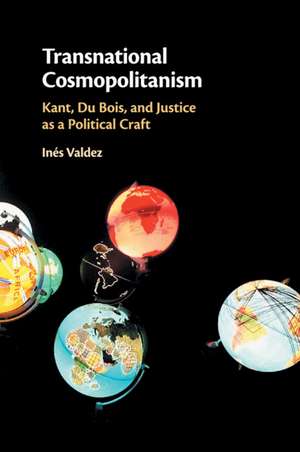Transnational Cosmopolitanism: Kant, Du Bois, and Justice as a Political Craft
Autor Inés Valdezen Limba Engleză Paperback – 16 sep 2020
| Toate formatele și edițiile | Preț | Express |
|---|---|---|
| Paperback (1) | 283.25 lei 6-8 săpt. | |
| Cambridge University Press – 16 sep 2020 | 283.25 lei 6-8 săpt. | |
| Hardback (1) | 590.38 lei 39-44 zile | |
| Cambridge University Press – 8 mai 2019 | 590.38 lei 39-44 zile |
Preț: 283.25 lei
Nou
Puncte Express: 425
Preț estimativ în valută:
54.20€ • 57.96$ • 45.19£
54.20€ • 57.96$ • 45.19£
Carte tipărită la comandă
Livrare economică 17 aprilie-01 mai
Preluare comenzi: 021 569.72.76
Specificații
ISBN-13: 9781108704809
ISBN-10: 1108704808
Pagini: 230
Dimensiuni: 151 x 229 x 14 mm
Greutate: 0.35 kg
Editura: Cambridge University Press
Colecția Cambridge University Press
Locul publicării:New York, United States
ISBN-10: 1108704808
Pagini: 230
Dimensiuni: 151 x 229 x 14 mm
Greutate: 0.35 kg
Editura: Cambridge University Press
Colecția Cambridge University Press
Locul publicării:New York, United States
Cuprins
1. The limits of Kant's anti-colonialism and his philosophy of history; 2. Vertical and horizontal readings of Kant's principles; 3. Du Bois and a radical, transnational, cosmopolitanism; 4. Race, identity, and the question of transnational solidarity in cosmopolitanism; 5. A transnationally cosmopolitan counterpublic; References; Index.
Recenzii
'By reading Kant 'disloyally' and mining Du Bois's anticolonial writings, Inés Valdez advances a radically transformed cosmopolitanism. Transnational Cosmopolitanism makes the case - brilliantly - that Du Bois's vision of transnational politics is essential to understanding and challenging global injustice today.' Lawrie Balfour, University of Virginia
'This book makes a vital and timely contribution to the cosmopolitan and global justice literature by combining a rigorous investigation of Kantian and neo-Kantian theory with an equally rigorous, historically informed analysis of Du Bois's anti-colonial vision and Pan-Africanism. Valdez not only highlights the Eurocentric, racist, and exclusionary assumptions of the cosmopolitan tradition, she charts an alternative path of transnational solidarity that re-centers the contributions of subaltern counterpublics and expands cosmopolitan considerations beyond the ongoing limitations of imperialism.' Jeanne Morefield, University of Birmingham and author of Empires without Imperialism
'In this excellent book, Inés Valdez powerfully reminds us that the 'postnational constellation' is also a postcolonial one. Thus the task before us is to theorize the normative grounds and political possibilities of a truly transnational cosmopolitanism that is aware of the blind spots of its own traditions. The dialogues Valdez constructs between Kant and Neokantians on the one hand and Du Bois and critical race theorists on the other hand are exemplary for the new kind of critical political theory we need. A great achievement that opens many doors.' Rainer Forst, Johann Wolfgang Goethe-Universität Frankfurt am Main
'In Transnational Cosmopolitanism political theorist Inés Valdez offers a readable and engaged explication of key ideas in the works of Kant and Du Bois about the intellectual origins of our modern conceptions of cosmopolitan identity and its limits. Offering a thoughtful narrative based on wide reading of the primary and secondary texts, Valdez establishes an important new voice in contemporary debates about the ideology of identity and its understudied transnational sources and implications. The book superbly exposes the fragility of political cosmopolitanism rooted exclusively in national conceptions of identity and nationhood.' Desmond King, Andrew Mellon Professor of American Government, University of Oxford
'Transnational Cosmopolitanism: Kant, Du Bois, and Justice as a Political Craft provides a theoretical framework to think about politics outside of the domestic and international realms which dominate theorization on cosmopolitanism, establishes W. E. B. Du Bois as a crucial interlocutor in the cosmopolitan literature, and opens dynamic new avenues of research on the political theory of transnationalism.' Emma Stone Mackinnon, The Review of Politics
'This book makes a vital and timely contribution to the cosmopolitan and global justice literature by combining a rigorous investigation of Kantian and neo-Kantian theory with an equally rigorous, historically informed analysis of Du Bois's anti-colonial vision and Pan-Africanism. Valdez not only highlights the Eurocentric, racist, and exclusionary assumptions of the cosmopolitan tradition, she charts an alternative path of transnational solidarity that re-centers the contributions of subaltern counterpublics and expands cosmopolitan considerations beyond the ongoing limitations of imperialism.' Jeanne Morefield, University of Birmingham and author of Empires without Imperialism
'In this excellent book, Inés Valdez powerfully reminds us that the 'postnational constellation' is also a postcolonial one. Thus the task before us is to theorize the normative grounds and political possibilities of a truly transnational cosmopolitanism that is aware of the blind spots of its own traditions. The dialogues Valdez constructs between Kant and Neokantians on the one hand and Du Bois and critical race theorists on the other hand are exemplary for the new kind of critical political theory we need. A great achievement that opens many doors.' Rainer Forst, Johann Wolfgang Goethe-Universität Frankfurt am Main
'In Transnational Cosmopolitanism political theorist Inés Valdez offers a readable and engaged explication of key ideas in the works of Kant and Du Bois about the intellectual origins of our modern conceptions of cosmopolitan identity and its limits. Offering a thoughtful narrative based on wide reading of the primary and secondary texts, Valdez establishes an important new voice in contemporary debates about the ideology of identity and its understudied transnational sources and implications. The book superbly exposes the fragility of political cosmopolitanism rooted exclusively in national conceptions of identity and nationhood.' Desmond King, Andrew Mellon Professor of American Government, University of Oxford
'Transnational Cosmopolitanism: Kant, Du Bois, and Justice as a Political Craft provides a theoretical framework to think about politics outside of the domestic and international realms which dominate theorization on cosmopolitanism, establishes W. E. B. Du Bois as a crucial interlocutor in the cosmopolitan literature, and opens dynamic new avenues of research on the political theory of transnationalism.' Emma Stone Mackinnon, The Review of Politics
Notă biografică
Descriere
Advances normative notion of transnational cosmopolitanism based on Du Bois's writings and practice, and discusses limitations of Kantian cosmopolitanism.
